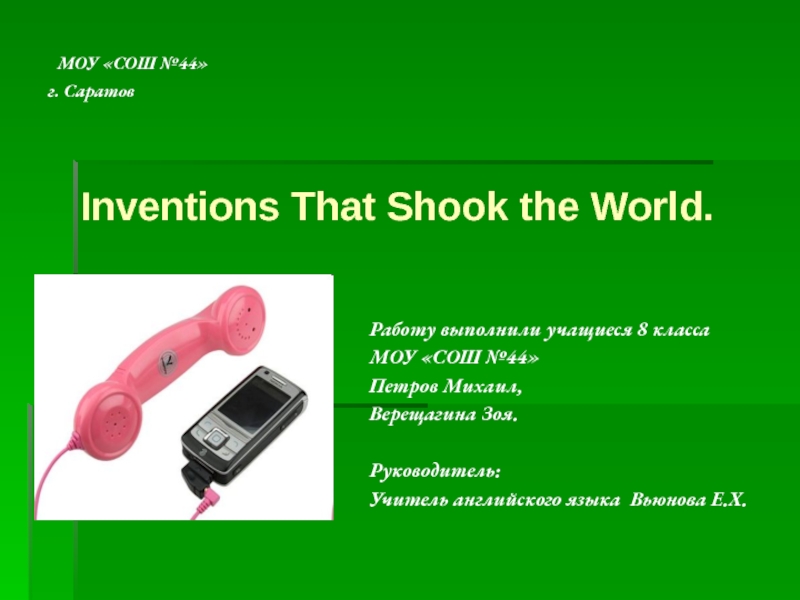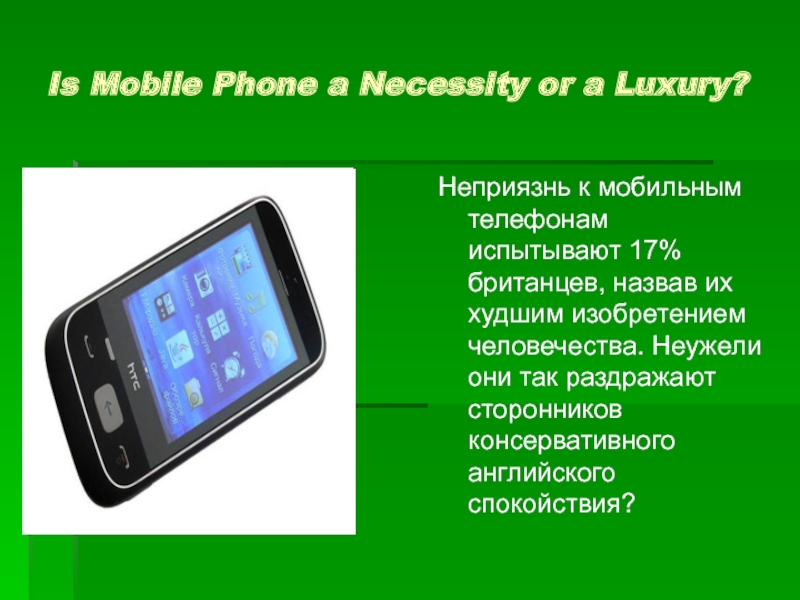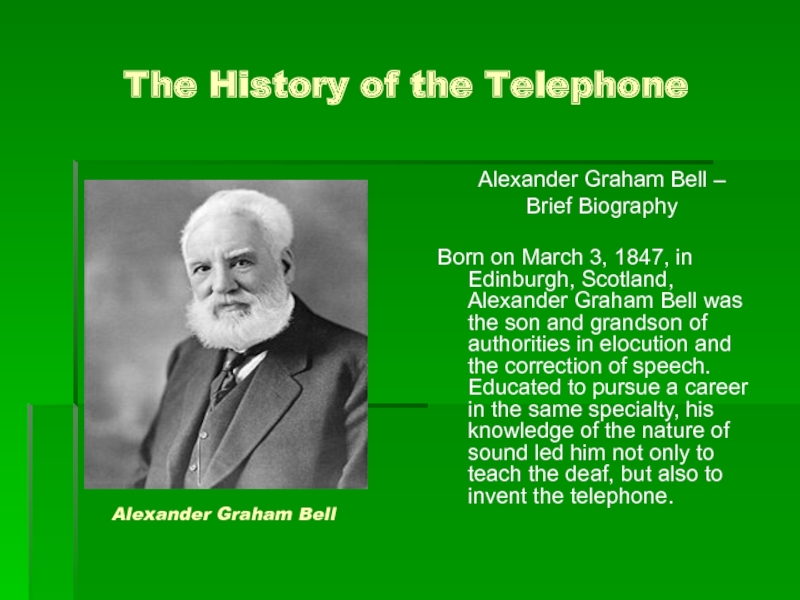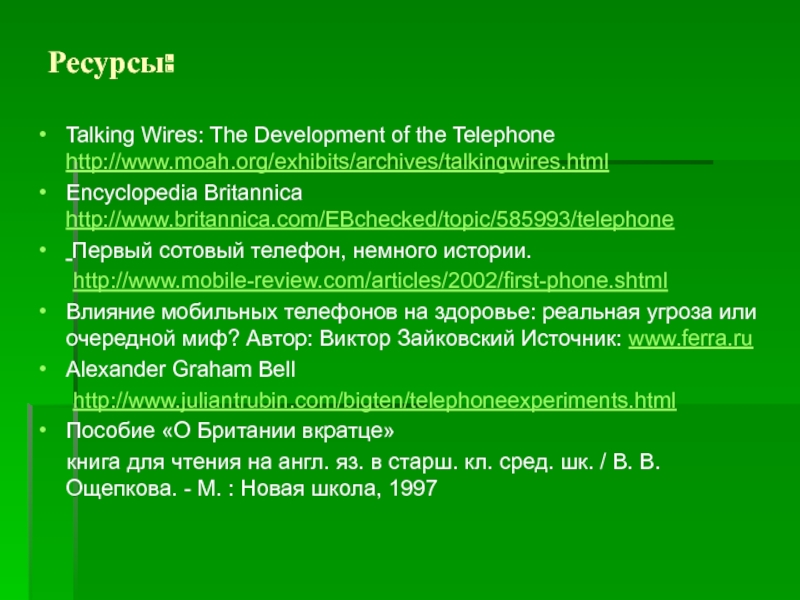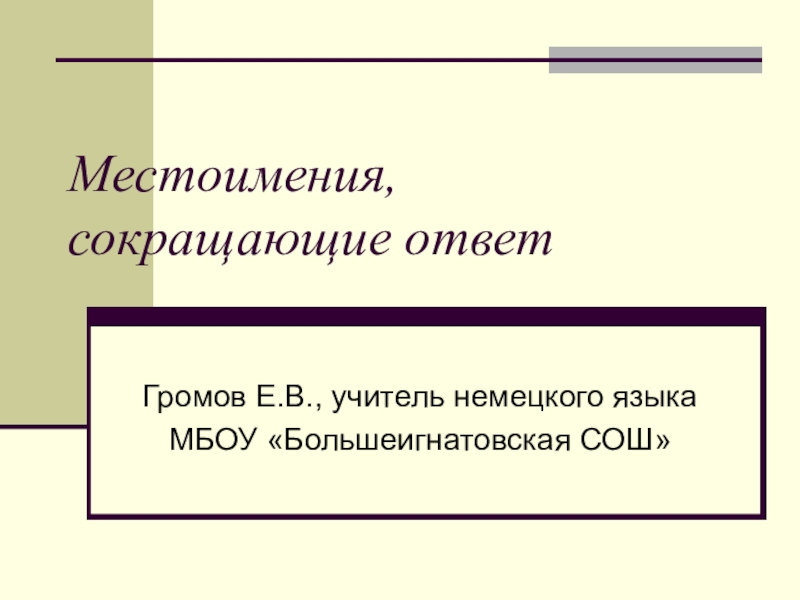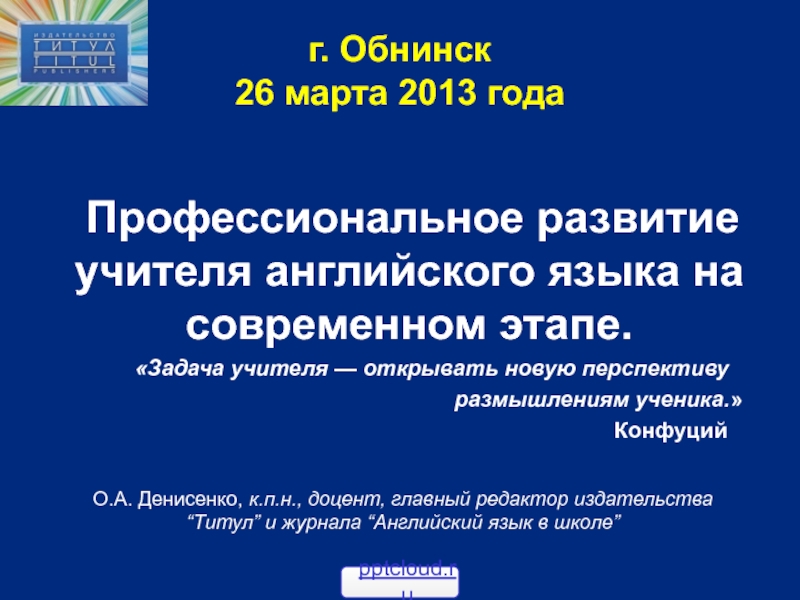Слайд 1 Inventions That Shook the World.
МОУ «СОШ №44»
г. Саратов
Работу выполнили учащиеся 8 класса
МОУ «СОШ №44»
Петров Михаил,
Верещагина
Зоя.
Руководитель:
Учитель английского языка Вьюнова Е.Х.
Слайд 2 Цель работы:
Расширить знания учащихся об истории великих
изобретений и великих открытиях в разных предметных областях; познакомить учащихся
с проектной деятельностью; познакомить учащихся с различными информационными технологиями для наиболее наглядного представления информации по теме.
Участвуя в проекте, работая в группах и индивидуально, вы познакомитесь с изобретениями и открытиями прошлых лет и их влиянием на ход истории и на современное общество, изучение исторических примеров поможет понять, как открытия прошлого способствуют прогрессу современных технологий и как на основе изобретений прежних лет развиваются технологии будущего.
Развитие умения обобщать материал и логически его излагать по данной теме.
Слайд 3Is Mobile Phone a Necessity or a Luxury?
Неприязнь к мобильным
телефонам испытывают 17% британцев, назвав их худшим изобретением человечества. Неужели
они так раздражают сторонников консервативного английского спокойствия?
Слайд 4The History of the Telephone
Alexander Graham Bell –
Brief Biography
Born
on March 3, 1847, in Edinburgh, Scotland, Alexander Graham Bell
was the son and grandson of authorities in elocution and the correction of speech. Educated to pursue a career in the same specialty, his knowledge of the nature of sound led him not only to teach the deaf, but also to invent the telephone.
Alexander Graham Bell
Слайд 5Alexander Graham Bell
In the 1870s, two inventors Elisha Gray and
Alexander Graham Bell both independently designed devices that could transmit
speech electrically (the telephone). Both men rushed their respective designs to the patent office within hours of each other, Alexander Graham Bell patented his telephone first. Elisha Gray and Alexander Graham Bell entered into a famous legal battle over the invention of the telephone, which Bell won. The telegraph and telephone are both wire-based electrical systems, and Alexander Graham Bell's success with the telephone came as a direct result of his attempts to improve the telegraph.
When Bell began experimenting with electrical signals, the telegraph had been an established means of communication for some 30 years. Although a highly successful system, the telegraph, with its dot-and-dash Morse code, was basically limited to receiving and sending one message at a time. Bell's extensive knowledge of the nature of sound and his understanding of music enabled him to conjecture the possibility of transmitting multiple messages over the same wire at the same time. Although the idea of a multiple telegraph had been in existence for some time, Bell offered his own musical or harmonic approach as a possible practical solution. His "harmonic telegraph" was based on the principle that several notes could be sent simultaneously along the same wire if the notes or signals
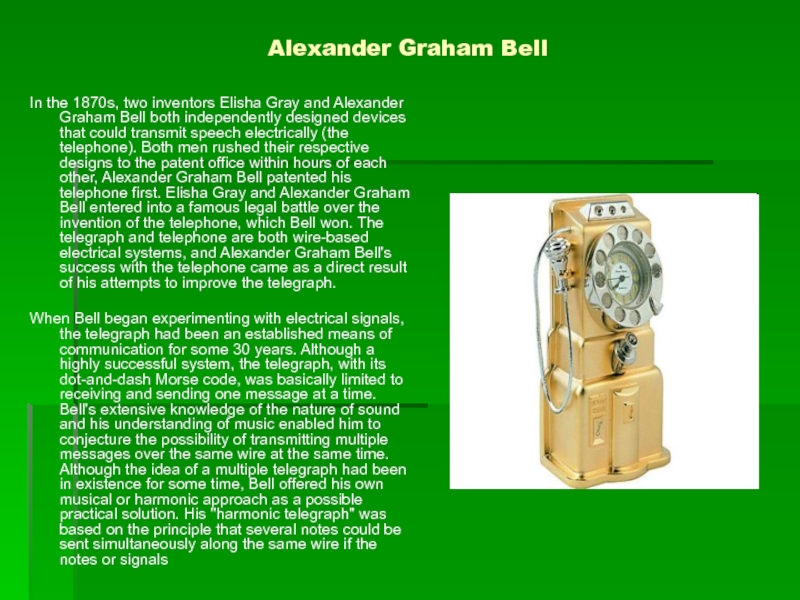
Слайд 6Alexander Graham Bell - Talk with Electricity
By October 1874, Bell's
research had progressed to the extent that he could inform
his future father-in-law, Boston attorney Gardiner Greene Hubbard, about the possibility of a multiple telegraph. Hubbard, who resented the absolute control then exerted by the Western Union Telegraph Company, instantly saw the potential for breaking such a monopoly and gave Bell the financial backing he needed. Bell proceeded with his work on the multiple telegraph, but he did not tell Hubbard that he and Thomas Watson, a young electrician whose services he had enlisted, were also exploring an idea that had occurred to him that summer - that of developing a device that would transmit speech electrically.
While Alexander Graham Bell and Thomas Watson worked on the harmonic telegraph at the insistent urging of Hubbard and other backers, Bell nonetheless met in March 1875 with Joseph Henry, the respected director of the Smithsonian Institution, who listened to Bell's ideas for a telephone and offered encouraging words. Spurred on by Henry's positive opinion, Bell and Watson continued their work. By June 1875 the goal of creating a device that would transmit speech electrically was about to be realized. They had proven that different tones would vary the strength of an electric current in a wire. To achieve success they therefore needed only to build a working transmitter with a membrane capable of varying electronic currents and a receiver that would reproduce these variations in audible frequencies.

Слайд 7Talking Wires: The Development of the Telephone
1877 The Beginning: The
initlal organization was called The Bell Telephone Company. In May
1877, six telephones were in commercial service. By November 1877, this number had grown to 3000 units.
1878 Local Expansion: Buslness was growing rapidly, Iimited by production of telephones as well as by other forces. The New England Telephone Company was formed to sell licenses to aspiring telephone company operators throughout New England.
1879 Nationwide Expanslon: There was a massive demand by people hoping to get into the telephone business.The National Bell Telephone Company, absorbing the function of the New England company, was formed to speed the licensing process across the country.
1880 Competition: Infringement suits against Western Union forced It to sell its burgeoning telephone business and apparatus to Bell. This equipment was combined with the National Bell Company, to form the American Bell Telephone Company· This remained the parent company of the Bell System until 1899.
1881 Manufacturing: Telephone growth (133,000) units by now) stretched the capabilities of the Charles Williams Electrical Machine Shop beyond its limits. Western Union had built a manufacturing capability around Elisha Gray's machine shop: American Bell purchased Jay Gould's interest in this shop, absorbed Williams' shop into it, transferred the Bell patents to the new organization and named it "The Western Electric Co".

Слайд 81889 The Final Structure: AT&T was formally designated as the
central organization of the Bell System. The directors of the
American Bell Telephone Company (which had been incorporated in Massachusetts) conveyed all of the assets, stocks and property to AT&T. It immediately started to build up its own "Long Lines Engineering Department" to plan for the wide-spread linking of the country. Within a year. AT&T formally created the Department of Long-Distance Lines. This department, changed in name only to the "Long Lines Department" in 1917, was from then on responsible for all telephone traffic links between the individual operating companies.
1900 Operating Companies: The various Bell operating companies, which handled the direct connections among local telephone sets, became more numerous during this period. Through licensing, acquisition and purchase, such companies as New York Telephone, New Jersey Bell, Pacific Bell, Illinois Bell, etc., were created during this period.
1909 Western Union acquisition: Through Theodore Vail's leadership, AT&T acquired a controlling interest in Western Union in 1909 and gave Vail the presidency of it. At this time, Western Union was in disastrous condition, owing to years of neglect. Vail proceeded to put a new face on the 25,000 locations, improving the public image. He ordered the offices cleaned and painted: he created service innovations such as reduced-rate night and weekend letters. He especially showed his genius as a charismatic leader by visiting employees of all ranks to hear of their problems, giving 50% wage boosts, making company loans to those in need, and instituting a pension and benefit plan. Needless to say, morale and business soared! However, just four years later in 1915, the U.S. Government forced the divestiture of Western Union from the Bell System.
1917 Government control: Acting with emergency war powers, President Wilson placed the railroads, telephone and telegraph systems under government control to assure efficlency and best usage for the prosecution of World War I.
1918 Nationalization: In July, Pesident Wilson proclaimed that all telephone and telegraph operations would be under the possession and control of the Post Office Department. Theodore Vail went to Washington, met with the chief of the Post Office Department, and in a rare burst of cooperation, the two men convinced the President that this was not in the best interests of the United States. In July 1919, the government returned the company to the owners.
1925 Consolidation: All research and development operations throughout the Bell System were consolidated into a new entity: Bell Telephone Laboratories. The Bell System was heading into its most glorious years before its divestiture in 1982. (written by a former Bell System employee)

Слайд 9Influence of mobile phones on health: real threat or the
next myth?
You for certain had to hear time and again
that mobile phones at long use do serious harm to an organism. From native, familiar, doctors, by radio or television. And it is valid, conversations on this theme don't stop since that moment when mobile phones only started to enter into our life. Whether however so it actually? Whether mobile phones are harmful to health? Or it only a myth? Today we will try to understand in the circumstances and we will familiarize with different versions and results of researches.
– The external aerial of any device (as, however, and internal) can lead to time dysfunction of vocal chords in view of constant disputes that from them more abruptly.
– Influence on a potentiality – positive: phone adhered to a device, will help to improve your sexual function, especially in a mode вибро.
– Kovyrjanie the aerial in an ear can lead to loss of acoustical function.
– Russification of menu Siemens М35 and С35 is capable to cause a mental disorder even in the professor of philology.
– Hanging on belt Ericsson А1018 or R320 it prevents to be bent to a foot that conducts to pathological infringements of impellent function.
Certainly, it simply jokes which went on the Internet and FIDO in 2001 when conversations on harm of use of mobile phones only just began. Since then phones have very far promoted in the development, and it has given new occasions to disputes on their harm. Thus, certainly, disputes became more. And if it was told basically about an adverse effect of radiation of the telephone transmitter on organs of hearing and a cerebral cortex it is now told and about influence on sexual system, on heart, on attention and ability to concentration, on informative function and even on a dream earlier. The Yellow press with diligence peculiar to it is distressed concerning awful harm from phones. Sellers of phones in shops – opposite, speak about absolute harmlessness and almost utility. To whom all the same to trust – to journalists who sleep and see, what their material inexplicably will affect consciousness ширнармасс, or to the sellers interested only in extraction of the maximum profit? We with pleasure would tell that in this point in question it is necessary to trust us, however to make it for some reasons we can not. Well, today we will familiarize with different versions about an adverse effect of phones on health and we will look at results of some researches.

Слайд 10It is a little about stories of mobile phones.
Немного об
истории мобильников.
Now there is no saying, who exactly has invented
mobile communication. As a matter of fact, main principles of a mobile telephony (use of frequencies by many subscribers, transfer of a call from one "honeycombs" to another) have been developed in Bell's well-known laboratories (the inventor of phone) in 1946. But only in the late sixties these workings out have remembered again.
Remember a suitcase радистки Ket? The first mobile phones were approximately same sizes.
It was the device in weight about 12 kg. It took place in a car luggage carrier, a control panel and a tube took out in salon, and for the sake of the aerial it was necessary to make a hole in a roof.
Сейчас трудно сказать, кто именно изобрел мобильную связь. Собственно говоря, основные принципы мобильной телефонии (использование частот многими абонентами, передача звонка от одной «соты» к другой) были разработаны в знаменитых лабораториях Белла (изобретателя телефона) еще в 1946 году. Но лишь в конце шестидесятых годов об этих разработках вспомнили снова.
Помните чемодан радистки Кэт? Первые мобильники были приблизительно таких же размеров.
Это было устройство весом около 12 кг. Оно размещалось в багажнике машины, пульт управления и трубку выносили в салон, а ради антенны приходилось продырявливать крышу.
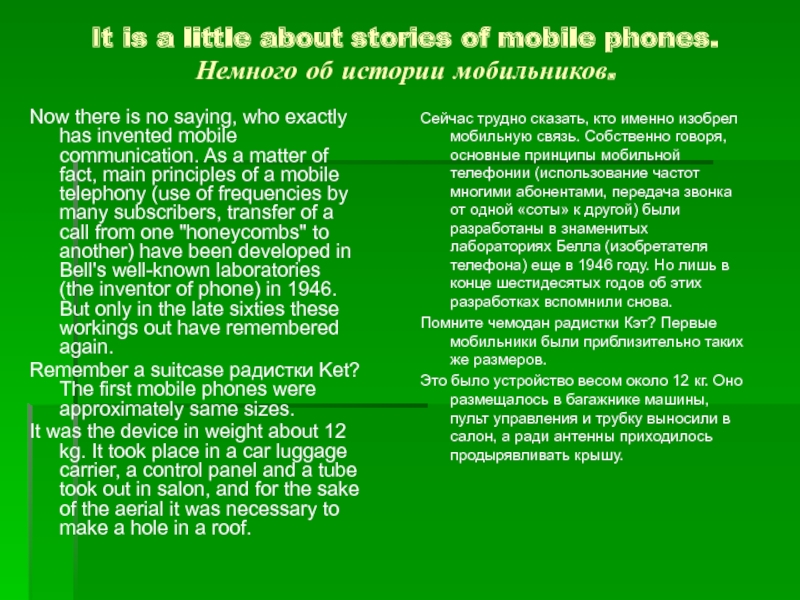
Слайд 11SAR – what is it?
According to definition, SAR (or Specific
Absorbtion Rate) is the unit of measure showing the maximum
specific capacity, absorbed by a human body at usual conversation by a cellular telephone. The maximum safe level – 2,0. And the overwhelming majority of modern phones have SAR from 0,5 to 1,0.
SAR – что это?
Согласно определению, SAR (или Specific Absorbtion Rate) – это единица измерения, показывающая максимальную удельную мощность, поглощаемую человеческим телом при обычном разговоре по сотовому телефону. Максимальный безопасный уровень – 2,0. А подавляющее большинство современных телефонов имеют SAR от 0,5 до 1,0.
Слайд 12влияние на биоэлектрическую активность мозга;
влияние на эндокринную систему;
влияние ЭМП сотовых
телефонов на познавательную функцию;
влияние на внимание и способность к концентрации;
влияние
на сон и иммунную систему.
Возможные последствия:
Слайд 13Более сильное воздействие на организм проявляется у маленьких детей. В
той же Великобритании, кстати, недавно был введён запрет на использование
и продажу телефонов детям младше 8 лет.
Слайд 14Выводы:
С каждым днем мы все больше и больше привыкаем к
тому, что постоянно должна быть мобильная связь. Мы стали уже
забывать то время, когда ее не было. Наши дети не представляют, как мы могли жить, не имея сотовых телефонов. Для них -это не роскошь, это необходимость.
Every day all of us it is more and we get used to that constantly there should be a mobile communication more. We began to forget already that time when it wasn't. Our children don't represent, as we could live, without having cellular telephones. For them - it not the luxury, is necessity.
Слайд 15Ресурсы:
Talking Wires: The Development of the Telephone http://www.moah.org/exhibits/archives/talkingwires.html
Encyclopedia Britannica http://www.britannica.com/EBchecked/topic/585993/telephone
Первый сотовый телефон, немного истории.
http://www.mobile-review.com/articles/2002/first-phone.shtml
Влияние мобильных телефонов
на здоровье: реальная угроза или очередной миф? Автор: Виктор Зайковский Источник: www.ferra.ru
Alexander Graham Bell
http://www.juliantrubin.com/bigten/telephoneexperiments.html
Пособие «О Британии вкратце»
книга для чтения на англ. яз. в старш. кл. сред. шк. / В. В. Ощепкова. - М. : Новая школа, 1997
